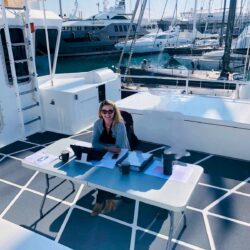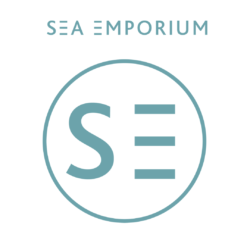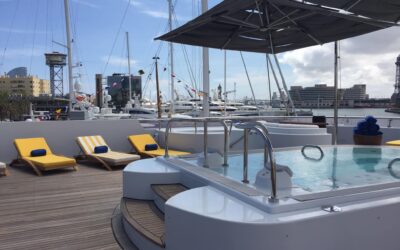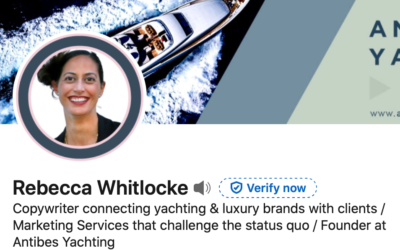Online Yachting Directory for Antibes
Helping you easily find local products, services & suppliers
Antibes Yachting goes beyond conventional business to connect you with opportunities and industry-specific advice.
Latest Business Listings
Rebecca's skills in public relations have made her a well-known entity in yachting and luxury market places. I would not hesitate to put the future of my business in her hands, as I know that she would push it to be as successful as she possibly could. I highly recommend Rebecca and Antibes Yachting.
Rhea Rouw, Company Owner, Yachting International Radio
Rebecca is a natural talent when it comes to writing, she helped me with my website and everything she wrote was spot on. One appointment to discuss quickly the general idea of what I wanted and a few days later, the website was ready with Rebecca's texts. I couldn't have asked for a better/faster/more efficient service. I was totally satisfied and I can only recommend Antibes Yachting !
Jocelyn Passeron, Owner, TheYachtPhotographer.com
Rebecca's knowledge of the French Riviera is second to none. Her posts offer a truly exciting style and insights of huge benefit to anyone visiting the south of France. I would not hesitate to recommend Rebecca to anyone looking for a true "guru" on the ground on the Cote d'Azur or to add great content to their blog/website. She researches any subject thoroughly and always surprises me with her fantastic writing.
Alexander Coles, Charter Broker, Bespoke Yacht Charter
Rebecca was my first call when I needed some website copy. She worked meticulously through my requirements to understand how I wanted to present myself to the industry and provided some excellent copy that we edited a few times to get it just how I liked. A completely painless experience with a professional.
George ‘Ben’ Gill, Founder & Owner, Miller Compton Maritime
Rebecca is an excellent writer and a great collaborator who brings value to our brand and the yachting industry with passion and dedication.
Mavi Iglesias, SEA Yacht Group
Rebecca's marketing & PR skills are excellent and she has helped our business greatly, especially during a time of introducing our brand, products and services to the superyacht industry.
Daniel Bruntsch, Global Head of Marine, BROMIC Heating
Add Your Business to Our Directory & Reach More Potential Customers
Latest News
Create Content For The Yachting Industry That Works
Getting your product or service in front of the right people is only part of posting on social media. You can’t just expect prospective customers to find you and love your content.
🔷 FOUR DRIVERS TO GET YOU STARTED:
👉 CONNECT
Subscribe to newsletters, forums, and social media groups in yachting, particularly if it’s focused on your target region.
👉SOCIAL LISTENING
Ask your customers what they’re interested in and build your content around that.
Respond to comments and shares.
Follow major industry hashtags on social media e.g. yachting, superyachts.
Follow your own hashtag on social media (there are also free tools that help you monitor your presence and company mentions online).
Focus your sales and marketing efforts where your target customer is spending the most time. Viral posts mean nothing if a lead doesn’t convert to a paying customer.
👉STORYTELLING
There are incredible people who have amazing backgrounds, however, because they aren’t necessarily big brands or well-known, their story is shelved. Many people are fixated on achievement and success, and they avoid sharing the struggles behind their progress. Be human – it’s OK to talk about challenges and the lessons you’ve learned – often the journey not the destination is what shows authenticity and humanity in our daily roles.
I would 100% prefer interviewing someone who tells me about their challenges, than someone who churns out the same corporate, formulaic dribble we’ve seen regurgitated a hundred times before.
👉CONSISTENCY & CREATIVITY WITH CONTENT
Useful, informative, and relevant content is an asset.
Build a community, not just followers.
In the yachting sector we’re so accustomed to hyper-editing to perfection, but the world won’t stop turning if you publish content that’s not 100% polished every single time.
Follow me on social media for more marketing tips for the superyacht industry:
LinkedIn: https://www.linkedin.com/company/antibesyachting
Instagram: https://www.instagram.com/antibesyachting
X: https://www.twitter.com/antibesyachting
Facebook: https://www.facebook.com/antibesyachting
Watch my session at Booking Manager Summit here:
The importance of social media for yachting companies
Social media is like a shop window; you have to keep polishing it so your customers can look in and see clearly.
✅ Three beneficial aspects of social media:
▪ It works 24/7 while you sleep, drink coffee, or fine tune your next party trick.
▪ It enables you to cross geographic barriers to reach new customers outside of your immediate location.
🛑 Three downsides to social media:
▪ Having to create unique content regularly – often great ideas come while you’re in the shower, stuck in the airport queue, or stealing your kids’ Monopoly money.
▪ Cyberbullying, digital addiction, and anxiety dealing with social media trolls and online nastiness. They say you’re not success on social media until you have at least one regular troll. Of course I blocked him!
I often encounter yachting companies who believe they have to be active on every social media platform, without understanding the impact of this.
Many businesses launch a new account on Threads, TikTok, Facebook, or Instagram, and then their content journey plateaus because they don’t have consistency with ideas or posting.
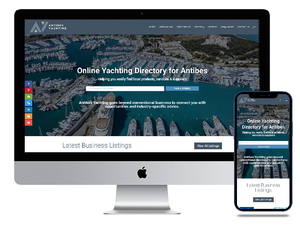
Antibes Yachting offers an online directory for yachting companies to grow their reach with customers
✅ Move from being a content consumer to a content creator. “You can spend 2 hours scrolling in the feed, or 2 hours creating content for your business“ When you create useful, informative, relevant content it is an ASSET and the bonus is you’re highly likely to get more referrals from others.
1) WHAT problems do you solve for customers
2) WHY your solution works
3) HOW it works
4) WHERE is the proof is (E.g. Client testimonials, portofolio examples, case studies).
If I can’t find this information on your Linkedin profile/page, or on your website I’m not coming back.
LinkedIn For Yachting Companies: How to customise your LinkedIn URL
LinkedIn has transitioned beyond just a job-hunting platform.
↪︎ Business opportunities and partnerships.
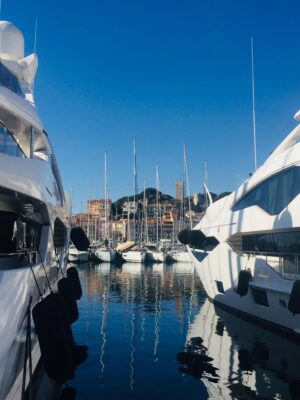
www.linkedin.com/in/rebecca-whitlocke-123ab456c
Step-by-step:
1️⃣ Click on “Me” at the top of your LinkedIn homepage.
2️⃣ Click on “View profile.”
3️⃣ Click on “Edit public profile & URL” on top right.
4️⃣ Click on the pencil icon: “Edit your custom URL”.
5️⃣ Create a personalised URL. LinkedIn will check the availability of the URL you entered. If it’s already taken or not allowed, you will need to use a different variation. Your custom URL must contain 3-100 letters or numbers. Please don’t use spaces, symbols, or special characters.
Save!
5 places where you can you use your LinkedIn URL:
- Add your URL to your email signature.
- Business cards (or a QR code is good too!)
- Presentations or conference slides.
- CVs.
- Website bios.
Top Public Relations Voice on LinkedIn
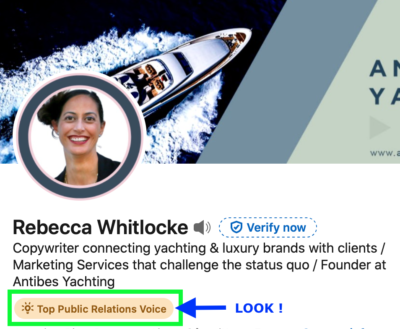
However, I love LinkedIn and here’s why:
🌐 AUDIENCE: LinkedIn has a higher % of my target HNW, yachting and event clients and allows me to connect with the right people for work. For example, of the hundreds of Fortune 500 CEOs on social media, 97% of them are on LinkedIn. I’ve built my network up to include well-known names in fashion, film, music, sports, tech and television.
🫶 COMMUNITY: I’ve built up a solid community over 13,000 members on LinkedIn who support my content. Then there’s the lurkers – who don’t engage, but suddenly drop into your inbox with an offer or partnership. I’ve met lots of people in person too so friendships have formed. LinkedIn also gives me another platform to talk about and highlight underrepresented charities or causes.
👍 ENGAGEMENT: LinkedIn challenges the over-the-top idea of being popular. There’s less people here who have an end game of posting purely to go viral. People appreciate the effort you make to share helpful content. LinkedIn is THE platform that allows me to rock the boat occasionally, fuel opinion and get decent engagement by challenging the status quo.
🧠 KNOWLEDGE: As with any platform, LinkedIn has its fair share of experts and gurus! However, there’s a lot of clever people here who I’ve learned from regarding brand positioning, content tools and business development. When you build your knowledge you avoid a mindset that your abilities are fixed and determined by your background, intelligence, luck or talent.
🚀 OPPORTUNITIES: I have received amazing business opportunities and partnerships via LinkedIn. Opportunities that I couldn’t see happening via X or Instagram.
Head over to LinkedIn to follow me there: https://www.linkedin.com/in/rebeccawhitlocke

